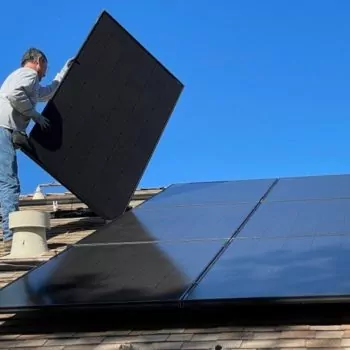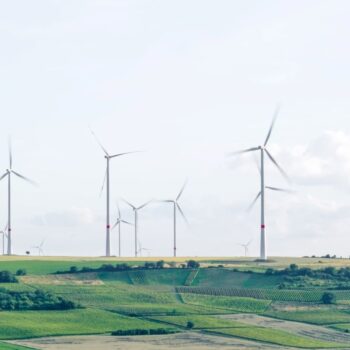The European Commission published the second batch of the new ‘Fit for 55’ plans today, sending contrasting political signals on the EU’s direction of travel as it decarbonises its economy. Co-legislators will now have to speed up the delivery of the European Green Deal, supporting both ambition and social acceptability.
The Gas Package confirms an insufficient strategy to reduce fossil gas consumption, which will make the transition riskier, more difficult, and more expensive. This concerning political signal is worsened by the agreement on the Trans-European Energy Networks for Energy (TEN-E) last night, which prolongs the eligibility of cross-border fossil gas infrastructure.
While the revision of the Energy Performance of Buildings Directive (EPBD) will accelerate the decarbonisation of buildings in the EU, the ambition level does not match the scale of the challenge.
The Council Recommendation on social and labour aspects of the transition reminds Member States of existing tools at their disposal but stops short of proposing more ambitious whole-of-society approaches.
Story
The Council and the European Parliament also reached an agreement last night on the revision of the Trans-European Networks for Energy (TEN-E) regulation, which sets out the criteria for cross-border energy infrastructure projects to receive EU funding and faster permitting.
The delivery of the European Green Deal as the cornerstone of the EU’s political agenda has now entered a critical phase. All EU institutions and Member States will be under scrutiny to demonstrate their commitment to delivering a socially fair and climate ambitious European Green Deal.
Read more about the expectations that were set on the new ‘Fit for 55’ plans, the Gas Package, the EPBD, the Council Recommendation on the social and labour aspects, and the implications for German politics.
Quotes – New ‘Fit for 55’ plans
Lucie Mattera, E3G Head of EU Politics, said:
“COP26 and the energy price crisis are raising the stakes for the EU to deliver climate ambitious and socially fair proposals. More than ever, the EU’s focus must shift to acceleration and delivery next year – co-legislators will play a crucial role here.”
Pieter de Pous, E3G Senior Policy Advisor, Fossil Transition Team, said:
„Die EU-Kommission hat heute unterschiedliche Signal ausgesendet. Das Gasmarkt-Paket wiederholt Fehler der Vergangenheit und greift zu kurz, während im Gebäudebereich zumindest gute Ansätze zu erkennen sind. Bundeskanzler Olaf Scholz hat heute gleichzeitig den kompletten Ausstieg aus fossilen Energien innerhalb der nächsten 23 Jahren angekündigt. Deutschland muss sich jetzt dafür einsetzen, dass das auch auf EU-Ebene umgesetzt wird.”
Raphael Hanoteaux, E3G Gas Politics Senior Policy Advisor, said:
“With the Gas Package, the European Commission had the opportunity to provide a clear pathway for consumers and businesses to shift away from fossil gas. The Commission acknowledges the need for a gradual phase-out of unabated gas. Yet, the tools to support consumers in this transition are disconnected from reality. Promises of cleaner gases risk delaying the transition, and most importantly could lock consumers into higher costs through oversized networks”.
Eleonora Moro, E3G Researcher on Energy Systems, said:
“This Gas Package proposal repeats past mistakes. It runs the risk of conflicts of interest in EU infrastructure planning by giving a major role to gas infrastructure operators. The revised TEN-E deal, agreed earlier today, provides a more independent and science-based framework for infrastructure planning that should be replicated for hydrogen infrastructure plans.”
Adeline Rochet, Buildings Decarbonisation Senior Policy Advisor, said:
“The revised Energy Performance of Buildings Directive improves the sense of travel towards decarbonisation. Deep retrofit of existing buildings will be accelerated thanks to mandatory Minimum Energy Performance Standards, while Zero Emissions Buildings definition will set standards for European buildings to be future proof. The EPBD is a mild but firm starting point for the Green Deal to reconcile climate ambition and social justice”
Namita Kambli, E3G Senior Researcher on Just Transition and the social dimension, said:
“The Commission’s guidance on addressing the social and labour aspects of the green transition is a welcome step in the right direction. However, the Commission needs to go from ‘encouraging’ Member States with existing measures to actually ensuring uptake and follow through. Without this, the European Green Deal will be socially fair only on paper”
Follow E3G on Twitter at @E3G for live updates and reactions.
Available for commentary
E3G experts are available for commentary – please contact them directly.
| Name Name | Expertise | Contact details |
| Lucie Mattera (EN, FR) | Overall Fit for 55 assessment & EU politics | m: +32 (0)489 00 44 76 lucie.mattera@e3g.org |
| Elisa Giannelli (IT, EN, FR) | Overall Fit for 55 assessment & EU politics | m: +32 (0)2 781 10 96 elisa.giannelli@e3g.org |
| Raphael Hanoteaux (EN, FR, ES) | Gas, Hydrogen, and Renewables | m: +32 (0) 496 205 903 raphael.hanoteaux.@e3g.org |
| Eleonora Moro (EN, IT, FR) | Gas package governance, Hydrogen, TEN-E regulation | m: +32 (0) 25 80 07 37 eleonora.moro@e3g.org |
| Adeline Rochet (EN, FR) | Energy Efficiency, buildings renovation, heating | m: +32 (0) 470 118 580 adeline.rochet@e3g.org |
| Namita Kambli (EN, FR, DE) | Just transition, social dimension | m: +49 170 928 98 56 namita.kambli@e3g.org |
| Pieter de Pous (EN, DE, NL) | German politics | m: +49 (0) 160 6573414 pieter.depous@e3g.org |
Notes to Editors
- E3G is an independent climate change think tank accelerating the transition to a climate safe world. E3G specialises in climate diplomacy, climate risk, energy policy and climate finance.
- In 2018, for the third year running, E3G was ranked the fifth most globally influential environmental think tank by the Global Go To Think Tank Index.


